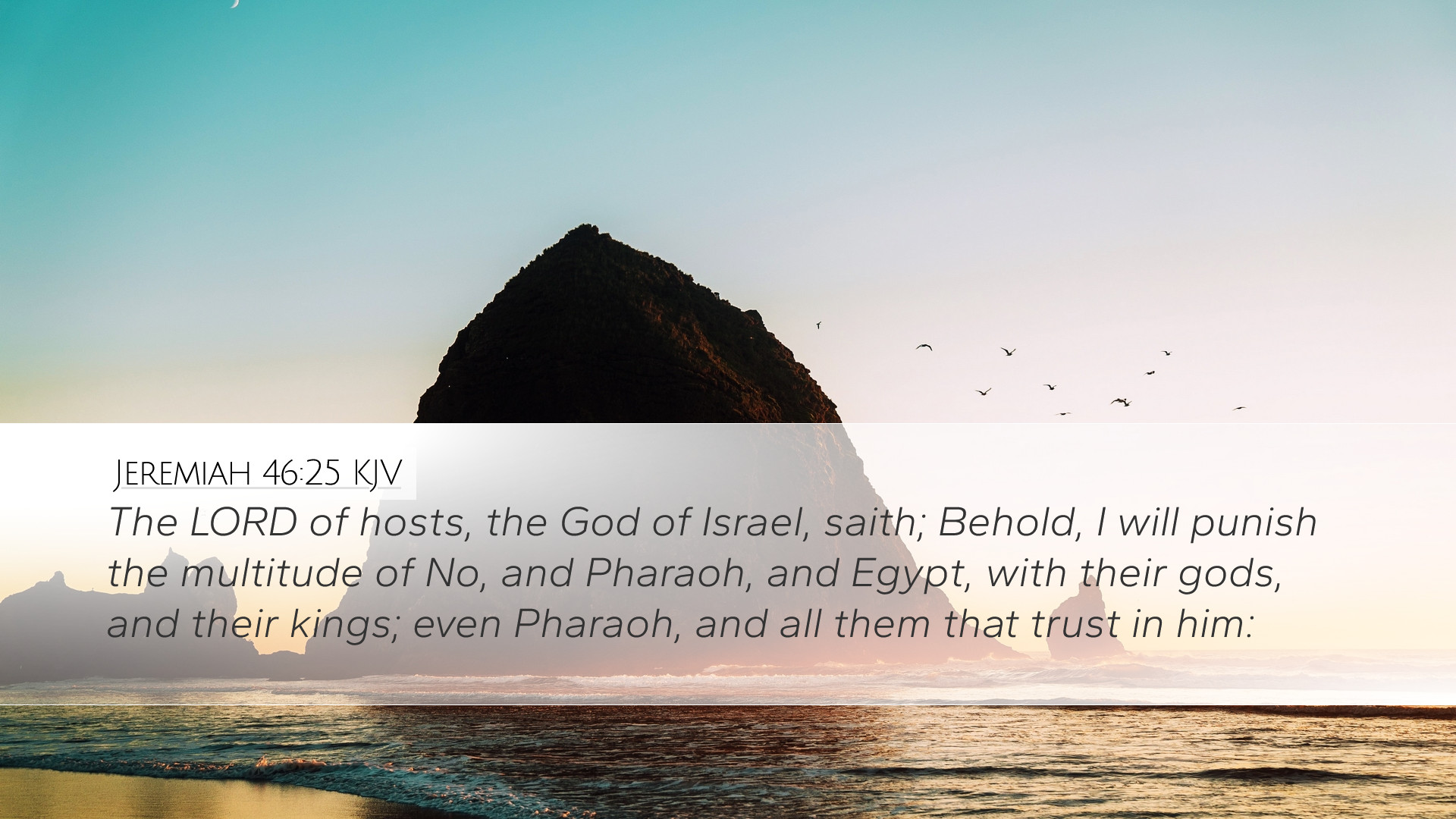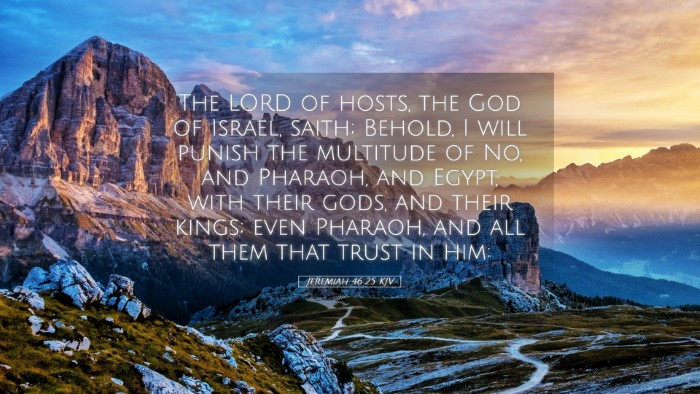Commentary on Jeremiah 46:25
Verse Context: Jeremiah 46:25 states, "The LORD of hosts, the God of Israel, says: 'I am about to bring punishment on Ammon of Thebes, and Pharaoh, and Egypt, along with their gods and kings. I will hand them over to those who seek their lives, to Nebuchadnezzar king of Babylon and his officers.'" This verse is part of a prophecy concerning the coming judgment on Egypt and its allies during the time of Babylon's ascendance.
Overview
This commentary seeks to provide a thorough understanding of Jeremiah 46:25, drawing insights from renowned public domain sources such as Matthew Henry, Albert Barnes, and Adam Clarke. The focus will be placed on the implications of God's judgment, the historical context, and the theological reflections pertaining to divine sovereignty and human agency within this passage.
Historical and Theological Context
The prophecy delivered in this verse is set against the backdrop of impending Babylonian conquest. Egypt, once a major power, is portrayed as powerless before the will of God. The Ammonites and Pharaoh’s reign are specifically mentioned, highlighting the interconnectedness of politics, religion, and national identity in the ancient Near East.
- Judgment Theme: The text explicitly underscores God's role as the supreme judge over nations. This theme resonates throughout the book of Jeremiah, reminding readers that divine governance supersedes human powers.
- Historical Significance: The specific mention of Egypt and its deities connects the prophecy with a well-known ancient rivalry. The destruction foretold serves as a historical lesson about the futility of relying on strength apart from God.
Commentary from Matthew Henry
Henry describes this verse as a demonstration of God’s sovereignty and the inevitable downfall of those who oppose His will. He articulates that the Ammonites, alongside the Egyptians, are seen not merely as national entities but as those opposing the covenant intentions of the Lord. Henry emphasizes that God's judgment is decisive, emphasizing the totality of His power over the false gods of Egypt.
He further remarks on the principal lesson to be drawn from the disaster that befell Egypt: the inevitability of divine justice against idolatry and arrogance. The assertion that God allows nations to rise and fall serves as a reminder of His ultimate authority in both historical and contemporary contexts.
Insights from Albert Barnes
Albert Barnes offers extensive commentary on the verse, focusing on the implications of God’s actions against Egypt. He notes that 'Ammon of Thebes' represents the pinnacle of Egyptian idolatry and cultural pride. Barnes elaborates that the 'gods' of Egypt signify the spiritual bankruptcy of a nation reliant on falsehood.
Additionally, Barnes discusses the phrase "I will hand them over" as indicating God's active involvement in the orchestration of historical events. He points out that God uses Nebuchadnezzar as an instrument of His judgment, illustrating the dynamic relationship between divine purpose and human agency.
Adam Clarke's Analysis
Adam Clarke provides a detailed examination of the idolatry associated with Egypt’s cosmology and the forthcoming judgment. He notes that the gods and kings mentioned are indicative of the societal structure that had remarkably deviated from devotion to the one true God. Clarke emphasizes that this passage serves as a prophetic warning about the dangers of complacency and assuredness in national strength without divine backing.
Moreover, Clarke's insights emphasize the necessity of spiritual vigilance, as he interprets the prophecy as not merely historical but also instructive for all nations. The significance of God's relentless hand upon nations that forget Him carries poignant implications for contemporary readers.
Theological Reflections
Jeremiah 46:25 serves as a profound reminder of God's sovereignty over human affairs. The implications of this verse extend beyond its original context to challenge modern readers to contemplate the role of divine authority in their lives and nations.
- Divine Sovereignty: This passage reinforces the belief that God governs the affairs of men and nations according to His purposes. Acknowledging this leads to a deeper trust in God's providential care amidst turmoil.
- Human Responsibility: The judgment pronounced upon Egypt also invites introspection regarding the nature of human choices in response to divine commands. The question for contemporary believers is whether they stand with or against God’s revealed truth.
- Idolatry Warning: The text is a caution against idolatry in any form—be it political, social, or spiritual. It challenges scholars and theologians to explore modern applications of this ancient exhortation.
Conclusion
In conclusion, Jeremiah 46:25 captures God's unwavering fidelity to His plans while simultaneously acting in judgment against nations that forsake Him for false idols. The combined insights from Matthew Henry, Albert Barnes, and Adam Clarke provide a multi-dimensional view of the verse, enriching the theological landscape for pastors, students, theologians, and scholars alike. Each commentator highlights the necessity of recognizing God’s sovereignty amid human history, affirming the timeless relevance of this prophetic message.


